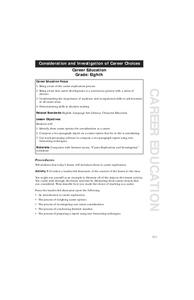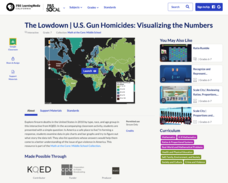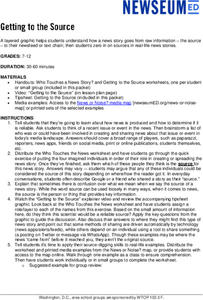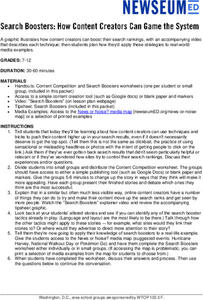National Wildlife Federation
Endangered Species: What and Where?
What do endangered species have in common with non-endangered species? Given an endangered species to read about, individuals choose another species that is not endangered to compare it to. As a class, they create a species book with the...
Curated OER
The Future Tense
What will your Spanish class learn today? Maybe they will learn all about the future tense! Take a look at this resource for information on ways to talk about the future without actually using the future tense, regular and irregular...
Macmillan Education
Know Yourself
After completing a short self-assessment, partners use the provided questions and take turns acting as life coaches.
Macmillan Education
Networking and Effective Communication
What makes a great networker? Learners explore valuable life skills and interpersonal character traits, and consider how to present oneself in the most effective way during an opportunity to network.
Learning for Life
Career Education
As part of a career exploration and investigation, learners research the Internet for possible career options and identify what type of educational preparation is required for those careers, as well as possible salary options,...
NPR
Define the Plastic Problem
Individuals identify a specific problem concerning plastics and write a problem statement, which describes the problem, explains why it's a problem, and identifies desired solutions.
West Contra Costa Unified School District
Average Rate of Change
The concept of slope gets an approachable, yet theoretical, treatment in a comprehensive algebra instructional activity. The use of functional notation and problem-solving techniques keep the material rigorous, but detailed teaching...
Council for Economic Education
GDP Data: Is the Economy Healthy?
Does the economy needs a check-up? Scholars analyze the gross domestic product (GDP) to determine the overall health of the current economy. They use a short video clip as well as economic data to determine the current growth of the...
Shakespeare Globe Trust
Fact Sheet: The First Globe
Where did actors perform plays during Shakespeare's era? Using the handout, pupils learn about London's historical Globe Theatre and discover which of Shakespeare's plays actors performed there. Scholars also explore the cause of the...
PBS
The Lowdown — U.S. Gun Homicides: Visualizing the Numbers
Is gun violence a big issue in America? Pupils explore gun deaths by type, race, and age group in a Math at the Core: Ratios interactive. The class tries to determine whether America is a safe place to live and use bar graphs and pie...
ProCon
Gun Control
According to some estimates, there are more guns than people in the United States. Learners decide if America should enact more gun control laws. They analyze information about gun deaths in the United States by year, read about the...
Alabama Wildlife Federation
Pasta Butterfly
From an egg to an adult and the stages in between, the butterfly leads a very active life. A hands-on activity has learners act out the different life cycle stages of the butterfly before venturing on an identification expedition. During...
EngageNY
End of Unit Assessment: Analyzing the Structure of Chávez’s Wrath of Grapes Speech
César Chávez gave his 1986 "Wrath of Grapes" speech to educate consumers about pesticide use. Scholars complete an end of unit 2 assessment, applying what they learned throughout the unit to a new text. They then analyze the structure of...
Encyclopedia Britannica
Beyond a Two-Party System
Young political scientists go beyond the two-party system and research third-party candidates running in the 2020 US Presidential election. Groups present background information about the candidate, the party's platform points, and a...
C-SPAN
How A Bill Becomes A Law
Seven steps are required for a bill to become a United States law. The Families First Coronavirus Response Act (H.R. 6201) is used as a model for the process of how a bill becomes a law. Class members work independently through a Google...
EngageNY
Forming a Research-Based Claim: Stakeholder Chart on Better Agricultural Water Management
How can industries manage water more sustainably? Building on the previous activity, scholars explore the topic by creating a stakeholder chart for agricultural water management. Next, they participate in the World Café discussion...
iCivics
Campaign Cash: Money Talks!
Money talks! And it can reveal a lot about political candidates. An 11-slide presentation examines how candidates raise and spend money on an election. The slides, using data from the 2016 Presidential election, reveal how much it costs...
Newseum
Getting to the Source
Reliable news stories are based on facts from reliable sources. Young journalists learn how to evaluate the reliability of news sources by watching a short explainer video. Teams apply their new source-digging skills to a current news...
Newseum
Search Signals: Understanding Your Top Hits
Class members watch a short video about the criteria used to drive search results to learn about how search engines work. Scholars use a "Search Signals" worksheet and a tip sheet to record information as they conduct a simple search of...
Newseum
Quick Skim or Deep Dive? Picking the Right Search Strategy
To search online to find answers to some questions requires only a quick skim, while others demand deep research. Scholars engage in a lesson that teaches them the difference and how to craft questions that produce the best online search...
Newseum
Search Boosters: How Content Creators Can Game the System
Scholars examine the techniques content creators use to boost their search rankings. After watching a short "Search Boosters" video, groups select a story from the "News or Noise? Media Map" and analyze the devices used in the story. The...
Texas Education Agency (TEA)
Maintaining Your Health and Well-Being
Future counselors and mental health professionals engage in two activities that give them insight into careers in human services. First, groups of four compare and contrast health and wellness apps and share their findings with the...
Global Oneness Project
Cultural Heritage: Recording a Native Language Dictionary
How do you rebuild a language that has been banned for years? A short video introduces high schoolers to Marie Wilcox, A Wukchumni Native American from Central California who, for over 20 years, worked on comprising a dictionary of the...
Centers for Disease Control and Prevention
Risks from Smoking
Discover what smoking does to one's body with a detailed reference page that points out the types of cancers and chronic diseases that can occur when using tobacco products.

























